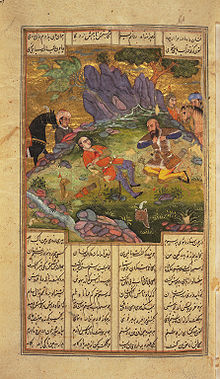Sohrab
Sohrāb ( Persian سهراب, DMG Suhrāb ) is a heroic figure from the epic " Shāhnāme " by the Persian poet Firdausi . He is the son of Rostam and Tahmine .
Origin and meaning
The name Sohrab comes from the Persian (سهراب) and is common as a first name in Persian-speaking countries. Originally the name goes back to the old Persian " Sorchapa " with the meaning "radiant and beautiful countenance" or "having a wine or ruby red sheen". Legend has it that Sohrab's mother gave him his name because he blushed while smiling after he was born.
Rostam and Sohrāb in Shāhnāme
The life story of Sohrab is told by Firdausi in a separate chapter on Rostam and Sohrāb . Sohrāb was born the son of Tahmine, daughter of the king of Samangan. He was born in Samangan Province (in what is now Afghanistan ) while his father was Rostam in Iran . Sohrāb grew up fatherless under the care of Afrasiab , king of Turan and hereditary enemy of Iran. Because of his physical superiority, he became the greatest hero around him. When Sohrāb found out from his mother that Rostam was his father, he decided to move to Iran to meet his father, Rostam, and to win the throne of Iran for him. He saw himself as Turan's heir apparent.
Afrasiab took the opportunity to arm Sohrab with an army to attack Iran. Kai Kawus , the Shah of Iran, now called Rostam for help in order to throw the Turan intruders out of the country. In the end there was a decisive duel between Rostam and Sohrāb in which Rostam killed Sohrāb. As he dies, Sohrāb reveals to the completely surprised Rostam that he, Sohrāb, was his son. As a sign of identification he gave him a bracelet that Rostam had once given to Sohrāb's mother.
The Turan army then withdrew to Turan. Rostam had his son transferred to his tomb and went into solitude for some time to mourn the death of his son.
Rostam and Sohrāb in Shāhnāme - Rückert's adaptation
The tragic story of the outshining hero Rostam, who kills his own son in a duel, is one of the outstanding stories of the story-rich Schahname. Firdausi proves to be a true master of storytelling. Friedrich Rückert , who accepted a professorship for oriental languages and literatures at the University of Erlangen in 1826, was so impressed by Firdausi's work that he published the story in his own revision in 1838. With this adaptation, Rückert, with his own linguistic talent, transferred the richly pictorial Persian language (Indo-European) into an independent German-language poetry. Rückert begins with:
"Let me tell you
about Rostem and Suhrab, the most beautiful of stories,
from heroic fame, how easily he acquired love for women,
and how his own son, killed by his father, died!"
With these four introductory lines, Rückert gives an outlook on the impending tragedy. Firdausi describes the figure of Sohrab in the following words:
“An elephant from body, milk and blood from cheeks
,
swiftly turned like a deer, dark glow in the eye, tall and slender with growth, the chest arched with courage.
He swung two arms around him like clubs,
and below stood two feet like clubs . "
See also
literature
- Friedrich Rückert : Rostem and Suhrab. A hero story in 12 books. Reprint of the first edition from 1838. epubli, Berlin, 2010, ISBN 978-3-86931-571-3 . (Details)
- Friedrich Rückert: Rostam and Sohrab . New edition. Epubli, 2010 ISBN 978-3-86931-684-0 . (Details)
- Friedrich Rückert: Rostam and Sohrab . New edition of the e-book. Epubli, 2011 ISBN 978-3-86931-939-1 . (Details)
- Jürgen Ehlers (ed. And translator): Abū'l-Qāsem Ferdausi: Rostam - The legends from the Šāhnāme . Philipp Reclam jun., Stuttgart, 2002, pp. 109–168 ( The story of Rostam and Sohrāb ) and 372.
Web links
- Rostam and Sohrab - Comic in English
- Battle between Rostam and Sohrāb, The In: Encyclopædia Iranica (music sample)
